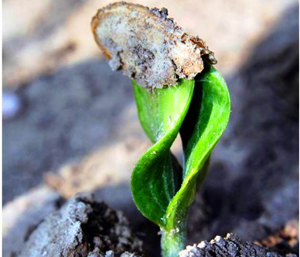Soil Science Society of America
5585 Guilford Road • Madison, WI 53711-5801 • 608-273-8080 • Fax 608-273-2021
www.soils.org
Twitter | Facebook
NEWS RELEASE
Contact: Hanna Jeske, Associate Director of Marketing and Brand Strategy, 608-268-3972, hjeske@sciencesocieties.org
Soil microbes, soil health and nutrient availability
April 14, 2016 – Farmers have soil tests done so they can calculate if they need to apply fertilizers, or change the pH of their soil. Many home gardeners have their soil tested as well. The Soil Science Society of America (SSSA) April 14 Soils Matter blog post explains that in the near future the nitrogen, phosphorus and potassium recommendations on your soil report may have just as much to do with microbes as it has to do with available nutrients.
 “Many growers and gardeners leave some or all of their crop residue on the soil,” says soil scientist, Will Brinton. “This is good for many reasons. The dead plant material is ‘recycled’ back into the soil. This adds nutrients – nitrogen, phosphorus, potassium and more – that you won’t have to add as fertilizer.” Brinton is a professor at the University of Maine, and Director, Woods End Soils Lab.
“Many growers and gardeners leave some or all of their crop residue on the soil,” says soil scientist, Will Brinton. “This is good for many reasons. The dead plant material is ‘recycled’ back into the soil. This adds nutrients – nitrogen, phosphorus, potassium and more – that you won’t have to add as fertilizer.” Brinton is a professor at the University of Maine, and Director, Woods End Soils Lab.
“Another form of recycling nutrients has to do with the geologic ‘parent material’ of soil – the original rocks and stones. Some researchers have called for reassessment of potassium fertilization since the pool of potassium from “fixed” sources – like rocks – was not considered available to plants.”
To read the entire blog post, visit http://soilsmatter.wordpress.com.
Follow SSSA on Facebook at https://www.facebook.com/SSSA.soils, Twitter at SSSA_Soils. SSSA has soils information on www.soils.org/discover-soils, for teachers at www.soils4teachers.org, and for students through 12th grade, www.soils4kids.org.